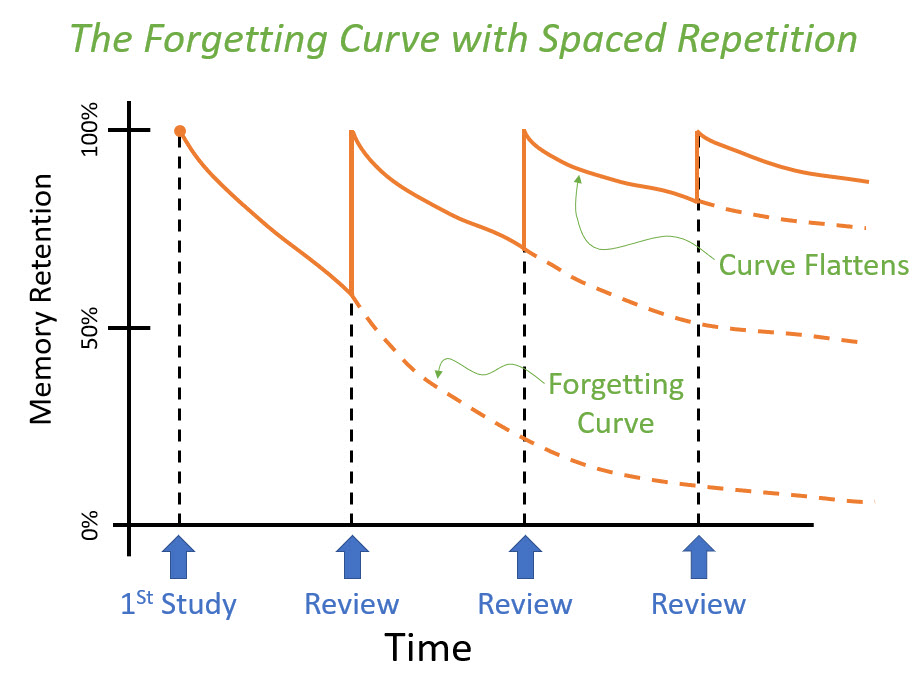Well, look no further!
Here are 4 research based study tips to help make your CQE journey as smooth as possible!
And these tips aren’t my opinion.
They’re based on scientific research into the field of learning and memory (Cognitive research).
I got these tips from a wonderful book called Make It Stick, The Science of Successful Learning.
I wanna share these tips with you to make your CQE Journey as smooth and easy as possible!
And rest assured, I’ve implemented all of these scientifically based study methods into my course – The CQE Master Class, to make sure it is as effective as possible!
Tip #1 – Take a lot of Practice Exams!
What the researcher shows is that one of the best methods for long-term memory formation is something called Active Retrieval or Active Learning.
This is essentially the idea that memories form, and are strengthened only when we attempt to retrieve them from memory.
This flies in the face of traditional study methods like reading, re-reading or highlighting your notes. Which the research calls passive learning, and is shown to be very ineffective.
What the research shows, is that the best way to form a memory is to attempt to retrieve or recall that memory.
It is this act of retrieval that signals our brain to form stronger memories of a topic!
And one of the best forms of active retrieval or active learning is the practice exam!
Because a practice exam forces us to retrieve information from memory.
Tip #2 – Used Spaced Repetition
Spaced repetition is a study method that requires you to space out your practice sessions.
To understand the idea of spaced repetition, you also must know about the forgetting curve.

The forgetting curve was discovered by a German psychologist (Hermann Ebbinghaus) in 1885.
In those experiments he was able to quantify the exact rate at which we humans forget.
He called this the Forgetting Curve and it shows that we humans generally forget nearly 50% of what we learn within only 20 minutes and 75% of what we learn in 1 week.
Ebbinghaus continued his research by studying the effect of what has since become known as Spaced Repetition.
What Ebbinghaus found was when he spaced out his study sessions, he could dramatically improve his long term memory over time.
A bunch of research since then has confirmed what Ebbinghaus originally uncovered.
Strategically spaced repetition of a particular topic interrupts the forgetting curve, and strengthens long term memory.
So what does this look like for the CQE Exam?
It means creating a daily study habit, where each day you learn a new topic, but also quiz yourself on previously studied topics.
In this way, you’re adding repetitions over time, and taking advantage of Tip #1, where you use active learning!
Tip #3 – Engage in Mixed Practice, not Mass Practice
Mass practice is when you do 30 practice exams on the SAME TOPIC.
Mixed practice is when you do 30 practice exams on SIMILAR (BUT DIFFERENT) TOPICS.
Baseball is the perfect example.

Researchers took a team of players and split them into 2 groups (mixed and mass practice).
The object of the practice was to get better at hitting curve balls.
The mass practice group went off and only practiced curve balls.
The mixed practice group went off and practiced hitting pitches through at random.
Some curve balls, some not.
Which group did better hitting curve balls?
The mixed practice group.
And the explanation makes perfect sense.
The first step in hitting a baseball is determining what pitch is being thrown at you.
Practicing when you know what pitch is coming eliminates that first step, and thus reduces the effectiveness of the practice.
The first step in solving a problem on the CQE Exam is determining what type of question is being asked.
The first step in solving a problem in real life is determining what type of problem it is.
Mass practice ends up gives you an illusion of mastery because you quickly and easily start answering questions correctly.
So how can you use this information to improve your study process?
Mix up your practice of course!
When you’re studying process capability, mix in questions from linear regression, SPC and DOE.
Topics that are similar in nature, and ones that force your mind to first determine what type of problem you’re solving.
Tip #4 – Put What Your Learning Into Practice
This is similar to tip #1. Practice what you’re learning.
It’s a form of active learning, but it’s more than that.
We as adult learn when we have context around what we’re learning.
We’re also motivated to learn when we reap the benefits of learning.
When you put what you’re learning into practice, you start reaping the benefits of the learning process.
This tip will help motivate you through the learning process.
And it will also reinforce the learning process, which improves your understanding of a topic, and your long term memory!
A classic win/win.
What does this mean for you on the journey to become a CQE?
You should be actively looking for opportunities to put your new knowledge into practice!
That way you can start growing yourself, and growing your career, long before you actually become a CQE!
The CQE Master Class
When I created my online course, The CQE Master Class, I made sure to include all of these research based study tips into the design of the course!
Every day you take a practice exam to get tons of active learning.
Then, in future quizzes I weave include questions from past lectures to get you that spaced repetition.
In those same daily quizzes I also include questions from other, similar topics to get you some mixed practiced.
Then, finally, we include a lot of real world examples in the daily video lectures to help inspire you to put this stuff into practice at work.